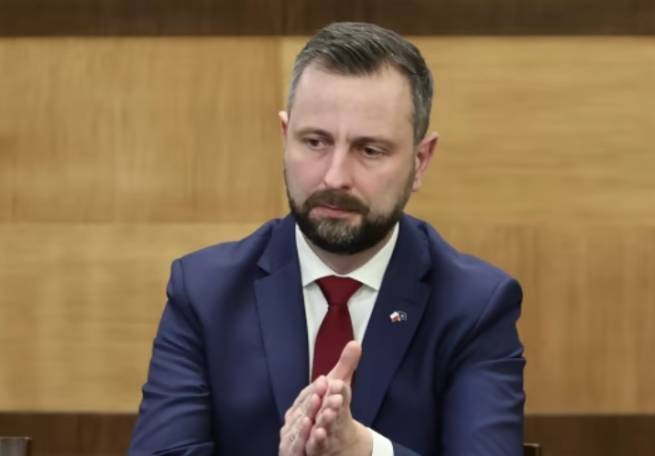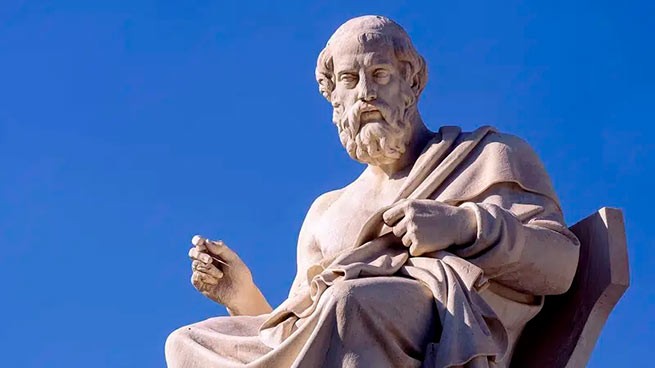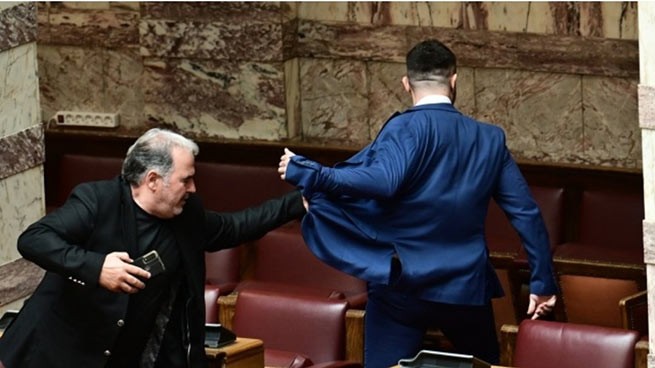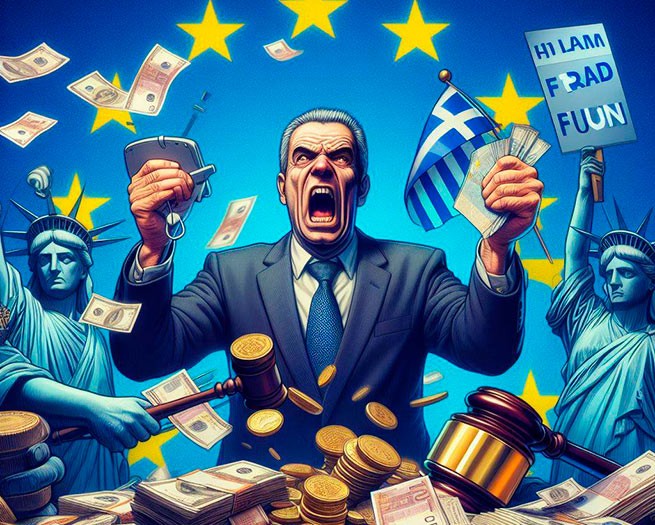Back in 1966, the hourglass of democracy in the country that spawned it began to devastate dangerously. Greece has embarked on a journey of no return. The political scene was like a gunpowder store, ready to explode. Everything indicated that the establishment of a dictatorship was only a matter of time.
This is a time of great historical and dramatic events. But at the same time, this is a period that inspired talents for unique creativity, when unsurpassed works are created, which are destined to leave their mark in the history of mankind.
The Epiphany celebration that year will mark the beginning of the unsurpassed piece of music “Romiosini”. It was the violence and repression by the police that forced the great Mikis Theodorakis to utter a phrase, probably with a double meaning, which should have remained in history.
Just months before the dictatorship was established by the colonels, the political climate in the country was particularly tense and remained with significant fluctuations after the end of the civil war.
As if both sides wanted to “close” their “open accounts”. However, the truth is that the situation began to spiral out of control as early as May 1963, when paramilitaries killed EDA deputy Grigoris Lambrakis in Thessaloniki. From that moment on, the country entered a severe crisis. The countdown to the junta began. This, as you know, happened on July 15, 1965.
On April 21, 1967, a military coup was carried out in Greece, as a result of which a regime of “black colonels” was established, which lasted until July 23, 1974.
The coming to power of the military in Greece was the result of many years of confrontation between left and right political forces, the roots of which go back to the 1920s, and which did not stop even during the German occupation in 1941-1944. The success of the insurgent officers was also facilitated by the constitutional crisis that lasted for two years in the country, known as “Apostasy-1965”.
Then the young King Constantine II, who ascended the throne after the death of his father King Paul in 1965, disagreeing with the limitation of his powers, dismissed only the government of the reformer Georgios Papandreou that had come to power.
Constant conflicts between the king and parliament led to frequent changes in the cabinet of ministers, and this led to instability in society. At the beginning of 1967, the development of the political crisis in Greece reached an extreme acuteness. The government was unable to cope with the growing discontent, and the opposition forces could not decisively turn the course of events in the right direction.
In this situation, the balance of forces formed in favor of the parties that advocated the democratic path of development. Fearing their victory in the parliamentary elections scheduled for May 28, 1967, the royal court and its sponsors prepared to impose a military dictatorship with the help of right-wing generals who were hesitant about the date of the coup. This was taken advantage of by a group of Greek mid-level officers led by Colonels Georgios Papadopoulos and Nikolaos Makarezos, and General Stylianos Pattakos.
At dawn on April 21, 1967, about 100 tanks were brought into the Greek capital, which occupied the most important points of the city infrastructure, starting with the Ministry of Defense. At the same time, there were targeted arrests of leading oppositionists, as well as all those who “sympathized” with the left. One of the first to be arrested was the commander-in-chief of the Greek army, who knew about the conspirators. In fact, they persuaded him to join them, and the commander-in-chief issued an order to launch an action plan (“Plan Prometheus”), which had been drafted long before these events in case of a communist threat.
The presence of the order, signed by the commander-in-chief, allowed the conspirators to control virtually the entire Greek army.
By the next morning, all of Greece was in the hands of the colonels. All leading politicians, including the prime minister, were arrested and placed in solitary confinement.
The military managed to seize power without any problems, since the inhabitants of Greece were tired of constant political crises and pinned their hopes on establishing stability with them.
The military who carried out the coup established a regime of open military dictatorship. For the black color of his uniforms and for the military rank of the leaders, he was called the dictatorship of the “black colonels”. The junta introduced a state of emergency in the country, virtually liquidated the institutions of democracy, banned strikes, meetings, established strict censorship, all political parties and a number of public organizations were disbanded. Government officials were appointed from the military, thousands of politicians were imprisoned, it was forbidden to listen to rock musicians, to support atheism and socialism.
King Constantine of Greece initially recognized the new government, but soon realized that he was only a puppet in the hands of a formidable enemy and began to prepare a counter-coup, relying on the forces of the Greek Navy and Air Force. The uprising began on December 13, 1967 in the port of Kavala, but was suppressed. As a result, senior officers loyal to the monarch were arrested, and the king himself fled to Italy with his family.
In order not to bring on a new wave of protests, the military government refused to immediately remove the king from power and demonstrated loyalty to the monarchy. In December 1967, the head of the military junta, Colonel Georgios Papadopoulos, became the prime minister of Greece, who in 1972, in the absence of the king, was appointed regent.
The Papadopoulos government has drafted a new constitution for the country, designed to legitimize the military dictatorship. In a referendum in September 1968, the new constitution was approved, but parliament was never convened, and most of the promises regarding electoral guarantees and civil liberties were never fulfilled.
The dictator Papadopoulos gradually reduced the harshness of his regime, carrying out an easy “democratization”. On June 1, 1973, the monarchy was abolished. Constitutional amendments adopted in July transformed Greece into a “presidential parliamentary republic.” Papadopoulos, who became president of the republic, lifted the state of emergency, freed political prisoners and formed a cabinet of ministers exclusively from civilians.
But let’s go back to the distant 1966. Mass and bloody rallies of protesters begin in the country. There are violent clashes with the police for many hours almost every day. During one of these demonstrations, a student, Sotiris Petrulas, is killed, and popular outrage intensifies.
Epiphany celebrations in Piraeus
In such a tense climate, Greece is celebrating the new year. On January 6, 1966, it was planned to consecrate the water area of the country’s largest port – Piraeus.
Georgios Papandreou believes that this is a great opportunity to demonstrate his strength against the “palace”, calling the date “Day of Resistance”.
Everything that happened next seemed inevitable. On Epiphany Day, thousands of angry protesters gather at the port. According to Center Union, their number exceeds 200,000.
Foreign correspondents report that the number of people in attendance reached 50 thousand, while the police spoke of less than 10 thousand! G. Papandreou himself arrives in Piraeus with a huge cortege.
Clashes soon erupt between protesters and police. Piraeus resembles a “battlefield”. Among the protesters who clash with the police are EDA MP and Λαμπράκη youth president Mikis Theodorakis, who is severely beaten.
Injuries and arrests darkened the religious holiday of the Epiphany: “… And the police were obliged, even if they were not provoked to attack, to protect the movement and freedom of citizens,” contemporaries say.
Time “Romiosini”
After the episodes that happened on January 6, 1966 in Piraeus, Theodorakis returns home, beaten, with his clothes covered in blood, and goes straight to his office. The next day, January 7, 1966, Mikis Theodorakis announced at a press conference that he began to compose nine poems from Yannis Ritsos’ Romiosini dedicated to those events: “I grabbed the manuscripts, and when I read the verse“ These trees heaven “(” Αυτά τα δέντρα δε βολεύονται με λιγότερο ουρανό “), I said that Romiosini’s time had come, and sat down at the piano.”
History stopped and the work became a cult.






More Stories
Ancient papyrus reveals Plato's burial site
Metropolitan Chrysostom: "The Church will never recognize same-sex marriage – the issue is not closed"
Schools in Germany: convert to Islam so as not to be an outsider